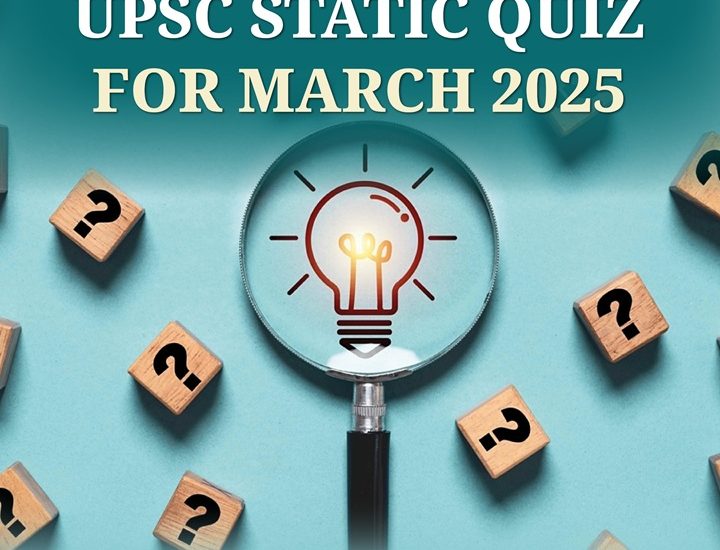
Static Quiz 21 March 2025 (Indian Financial system)
Static Quiz 21 March 2025 (Indian Financial system)
Info
Static Quiz 21 March 2025 (Indian Financial system) For UPSC Examination
You’ve gotten already accomplished the quiz earlier than. Therefore you can’t begin it once more.
You should register or signal as much as begin the quiz.
It’s important to end following quiz, to begin this quiz:
-
Query 1 of 5
Just about ‘Fiscal Marksmanship’, which of the next statements is right?
RightReply: (b) It refers back to the accuracy of the federal government’s forecast of fiscal parameters.
Clarification:
Fiscal Marksmanship refers back to the accuracy with which the federal government can forecast key fiscal parameters like income, expenditure, and monetary deficit. An absence of fiscal marksmanship results in deviations between finances estimates and precise figures. It highlights the significance of real looking finances preparation.IncorrectReply: (b) It refers back to the accuracy of the federal government’s forecast of fiscal parameters.
Clarification:
Fiscal Marksmanship refers back to the accuracy with which the federal government can forecast key fiscal parameters like income, expenditure, and monetary deficit. An absence of fiscal marksmanship results in deviations between finances estimates and precise figures. It highlights the significance of real looking finances preparation. -
Query 2 of 5
Just about taxation regime in India, which one of many following statements is right concerning ‘Surcharge’?
RightReply: (b) The federal government can utilise the proceeds of surcharge for whichever goal it deems match.
Clarification:
A surcharge is a further cost on taxes utilized to high-income people or particular classes of taxpayers. The proceeds of the surcharge should not a part of the divisible pool and stay fully with the Union Authorities, permitting it to make use of the funds at its discretion. Surcharge isn’t shared with states.IncorrectReply: (b) The federal government can utilise the proceeds of surcharge for whichever goal it deems match.
Clarification:
A surcharge is a further cost on taxes utilized to high-income people or particular classes of taxpayers. The proceeds of the surcharge should not a part of the divisible pool and stay fully with the Union Authorities, permitting it to make use of the funds at its discretion. Surcharge isn’t shared with states. -
Query 3 of 5
Which of the next finest describes the excellence between Public Items and Personal Items?
RightReply: (b) Buying energy of an individual determines whether or not he/she will be able to avail the personal items, whereas it’s not so in public items.
Clarification:
Public items are non-excludable and non-rivalrous, which means they’re accessible to everybody, no matter their means to pay (e.g., road lighting, nationwide protection). Personal items are excludable and rivalrous, which means solely those that have the buying energy can entry them. Public items are usually offered by the federal government resulting from market failure.IncorrectReply: (b) Buying energy of an individual determines whether or not he/she will be able to avail the personal items, whereas it’s not so in public items.
Clarification:
Public items are non-excludable and non-rivalrous, which means they’re accessible to everybody, no matter their means to pay (e.g., road lighting, nationwide protection). Personal items are excludable and rivalrous, which means solely those that have the buying energy can entry them. Public items are usually offered by the federal government resulting from market failure. -
Query 4 of 5
Think about the next statements concerning the phrases typically seen with respect to Finances:
1. Income Receipts means all of the revenue which doesn’t enhance the legal responsibility for the Authorities.
2. Capital Receipts embrace all Income and Non-Income Receipts of the Authorities.
Which of the next statements is/are right?RightReply: (a) 1 solely
Clarification:
• Assertion 1 is right: Income Receipts are authorities earnings that don’t enhance liabilities or scale back property, resembling taxes and curiosity receipts.
• Assertion 2 is wrong: Capital Receipts are non-revenue receipts that both enhance liabilities (e.g., loans) or scale back property (e.g., disinvestment). It doesn’t embrace income receipts.IncorrectReply: (a) 1 solely
Clarification:
• Assertion 1 is right: Income Receipts are authorities earnings that don’t enhance liabilities or scale back property, resembling taxes and curiosity receipts.
• Assertion 2 is wrong: Capital Receipts are non-revenue receipts that both enhance liabilities (e.g., loans) or scale back property (e.g., disinvestment). It doesn’t embrace income receipts. -
Query 5 of 5
Which of the next are a part of the Income Expenditure of the Authorities?
1. Expenditure on Social Companies
2. Grants given by the Authorities to overseas nations
3. Mortgage Repayments by the Authorities
4. Mortgage Disbursals by the Authorities
5. Subsidies given by the Authorities
How lots of the above choices are right?RightReply: (b) Solely three
Clarification:
• Expenditure on Social Companies (Sure): This can be a recurring expense incurred for welfare schemes, which is a part of income expenditure.
• Grants given by the Authorities to overseas nations (Sure): Grants are a part of income expenditure as they don’t lead to asset creation.
• Mortgage Repayments by the Authorities (No): Mortgage reimbursement reduces liabilities and is a part of capital expenditure.
• Mortgage Disbursals by the Authorities (No): Mortgage disbursals are thought-about capital expenditure as they lead to asset creation.
• Subsidies given by the Authorities (Sure): Subsidies are recurring expenditures and are a part of income expenditure.IncorrectReply: (b) Solely three
Clarification:
• Expenditure on Social Companies (Sure): This can be a recurring expense incurred for welfare schemes, which is a part of income expenditure.
• Grants given by the Authorities to overseas nations (Sure): Grants are a part of income expenditure as they don’t lead to asset creation.
• Mortgage Repayments by the Authorities (No): Mortgage reimbursement reduces liabilities and is a part of capital expenditure.
• Mortgage Disbursals by the Authorities (No): Mortgage disbursals are thought-about capital expenditure as they lead to asset creation.
• Subsidies given by the Authorities (Sure): Subsidies are recurring expenditures and are a part of income expenditure.
Leave a Reply